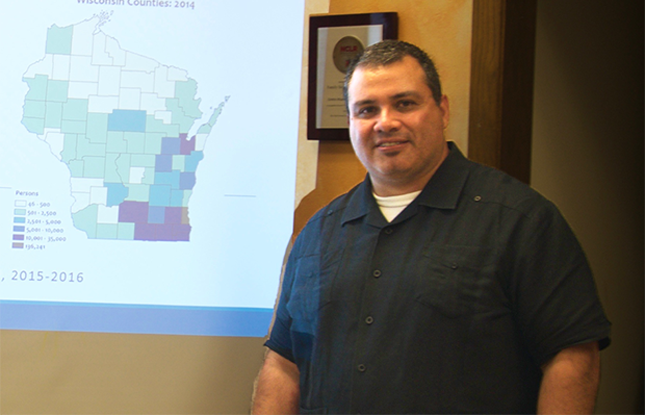
Professor Armando Ibarra is a tireless advocate for Wisconsin’s Latin@ community, dedicating his teaching and research to ensuring the needs of the state’s Latin@ population are being met.
“The best way to do this,” Ibarra says, “Is by having those conversations.” And those conversations always start with a simple question: “What do you want?”
Ibarra, a professor in Chican@ and Latin@ Studies at UW-Madison and the UW-Extension School for Workers, asked this question often while leading the largest-ever study of Latin@s in the state of Wisconsin—the Wisconsin Latino Communities Incorporation Processes. The study spanned communities in seven counties across the state.
Ibarra asked each community participating in the study that simple question (and others), and, while responses varied, the overwhelming consensus focused on three concerns:
- Families wanted to learn more about how the Wisconsin K-12 school programs worked in order to give their children the tools they needed to succeed throughout the school systems.
- Members of the community wanted classes focused on entrepreneurship so that they could cultivate skills to properly run businesses.
- There was a great deal of interest in leadership training so that individuals could make sure their voices and the voices of their peers were heard within and outside of their communities.
His research has revealed important insights into Wisconsin’s Latin@ community, but Ibarra is quick to emphasize the collaborations needed to complete a study of this magnitude. Students, in particular, have a hand in everything Ibarra does. Eight UW-Madison students were hired and trained in order to participate fully in the Processes study, working with the communities surveyed in order to ask questions and build relationships.
“The great students at UW make us keep researching and being at the top of our profession” Ibarra says, “They are of the highest caliber.”
Students feel the impact of the class even after graduation. They learn the importance of providing service that is practical, research-based and leads to stronger communities.
Now in 2017, Ibarra and his students will focus on implementing the recommendations that they have received from the communities, with goals of building trust in the Latin@ communities and providing services that line up with community requests.
These recommendations are influenced not just by the statewide study, but also by the many other projects and causes Ibarra is involved with.
In Madison, Ibarra works with Path to Citizenship, a program that provides assistance so that permanent, legal residents can overcome barriers to citizenship. Some of these barriers include cost (the application fee alone is $725), language and accessibility to proper legal help.
Scholarships and grants help ease the financial burden of those ready to take the citizenship exam, and citizenship courses are administered for low-level English speakers.
Programs like these not only have a direct impact on the smaller communities that they operate in, but also the state and the nation, says Ibarra. “Latin@s who have become citizens vote more than any other demographic when looking at all elections, local or otherwise.”
Ibarra also teaches Chican@ and Latin@ studies 530: Latino Communities in Small Towns and Rural Areas at UW-Madison. In this Service Learning course, students learn the basics of the social sciences literature on immigrant and generational incorporation and deliver presentations within the communities based on findings from Ibarra’ study, Latino Wisconsin.
Service Learning courses at UW-Madison require 25 hours of work with the community outside normal classroom time, so Ibarra’s students get a real-world opportunity to work outside of campus.
“It is very different than learning about methods” says Ibarra, “Students are embedded in a community and are challenged in new ways.”
Within the communities, Ibarra’s students tackle many different focuses. Some work on curriculums around citizenship training, much like the Path to Citizenship program. Some work within the Latino Academy of Workforce Development to assist in empowering Latino adults to succeed and integrate into the economic and educational systems of Dane County. Other students have worked in the Centro Hispano of Dane County as tutors and mentors for middle and high school students.
“Students feel the impact of the class even after graduation” says Ibarra, adding that many students continue to involve themselves in research and volunteering long after completing the class. “They learn the importance of providing service that is practical, research-based and leads to stronger communities.”
When Professor Ibarra chose to come to Wisconsin in 2011, he did so because of the Wisconsin Idea. After years of research, he continues to carry out the Idea within Latin@ communities throughout the state—a state that has become his home.
Ibarra recognizes the difficulties he faces in his work, and that things aren’t always easy. But he emphasizes his commitment to Wisconsin. “We don’t leave home. We work to change it.”
Story courtesy of the Morgridge Center for Public Service.

